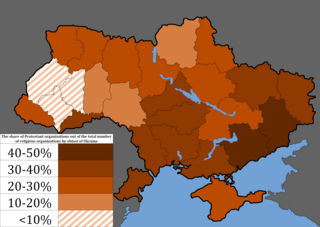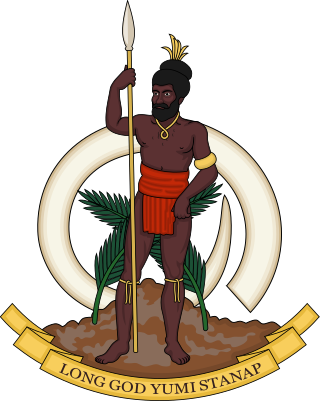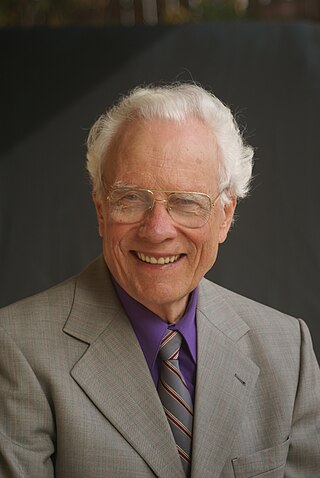It Is Written is an internationally broadcast Seventh-day Adventist Christian television program founded in 1956 by George Vandeman. Its title comes from the Gospel of Matthew: "It is written, 'Man shall not live by bread alone, but by every word that proceeds out of the mouth of God.'" The programs are produced by the Adventist Media Center in California.

The Seventh-day Adventist Church had its roots in the Millerite movement of the 1830s to the 1840s, during the period of the Second Great Awakening, and was officially founded in 1863. Prominent figures in the early church included Hiram Edson, Ellen G. White, her husband James Springer White, Joseph Bates, and J. N. Andrews. Over the ensuing decades the church expanded from its original base in New England to become an international organization. Significant developments such the reviews initiated by evangelicals Donald Barnhouse and Walter Martin, in the 20th century led to its recognition as a Christian denomination.
The Seventh-day Adventist baptismal vow is a list of 13 belief statements which a person joining the Seventh-day Adventist Church is given and accepts at believer's baptism. In Adventist understanding, baptism, is associated with officially joining the Adventist church, which is a part of the community of believers in Christ. The vow is explained in the church manual. In 2005 an alternate vow consisting of three statements was approved at the General Conference Session, and the baptizing pastor now has a choice of which set to use. They complement the 28 Fundamentals.
Progressive Adventists are members of the Seventh-day Adventist Church who prefer different emphases or disagree with certain beliefs traditionally held by mainstream Adventism and officially by the church. While they are often described as liberal Adventism by other Adventists, the term "progressive" is generally preferred as a self-description. This article describes terms such as evangelical Adventism, cultural Adventism, charismatic Adventism, and progressive Adventism and others, which are generally related but have distinctions.
Dwight K. Nelson is a Seventh-day Adventist evangelist and author.

Arthur Grosvenor Daniells was a Seventh-day Adventist minister and administrator, most notably the longest serving president of the General Conference. He began to work for the church in Texas in 1878 with Robert M. Kilgore and also served as secretary to James and Ellen White for one year, and later worked as an evangelist. In 1886, he was called to New Zealand, and was one of the pioneers of the Seventh-day Adventist Church in the South Pacific. Daniells had astounding success through his dynamic preaching and on October 15, 1887, he opened the first Seventh-day Adventist church in New Zealand at Ponsonby. While there he served as president of the New Zealand Conference , and of the Australia Conference. Later, he became the president of the Australasia Union Conference before becoming president of the General Conference in 1901 and served as president until 1922.

John Allen Burden (1862–1942) was an American Seventh-day Adventist minister, administrator, and medical missionary instrumental in founding sanitariums, restaurants, and health food factories. At the age of 9, John attended Adventist meetings for the first time and was introduced to the writings of Ellen G. White, which left a lifelong impression upon him. Five years later he was baptized, and at the age of 18 (1880) moved with his family to Oregon. John met Eleanor A. Baxter (1865–1933) as a student at Healdsburg College. They were married in 1888 while working for the Rural Health Retreat, of which John became manager in 1891.
Kenneth H. Wood, Jr. was a Seventh-day Adventist minister, author and editor. Since 1980 he served as chairman of the Ellen G. White Estate board of trustees. By virtue of this position he also served as an ex officio member of the General Conference Executive Committee.

Protestants in Ukraine number about 600,000 to 700,000 (2007), about 2% of the total population. Nearly all traditional Protestant denominations are represented in the country. According to Christianity Today magazine, Ukraine has become not just the "Bible Belt" of Eastern Europe, but a "hub of evangelical church life, education, and missions". At present, the country is a key supplier of missionaries and a center of evangelical training and press printing for all the countries of the former Soviet Union, where the legal environment is not so favourable.

The Romanian Union Conference of Seventh-day Adventists is Romania's seventh-largest religious body, part of the worldwide Seventh-day Adventist Church. At the 2011 census, 85,902 Romanians declared themselves to be Seventh-Day Adventists. The church put its own membership at 62,215 in 2020. Ethnically, in 2002, they were 83.5% Romanians, 9.7% Hungarians, 4.9% Roma, 1.4% Ukrainians and 0.5% belonged to other groups. The denomination has 1,185 church buildings and some 340 pastors. It originates in the 19th century and is divided into six local conferences, standing for and named after some of the country's main historical regions: Banat, Northern Transylvania, Southern Transylvania, Moldavia, Muntenia and Oltenia.
George Edward Vandeman was a Seventh-day Adventist evangelist who founded the It Is Written television ministry.
Edward Earl Cleveland was an American writer, civil rights advocate and evangelist of the Seventh-day Adventist Church.

Automobile roads in Belarus are classified into several categories.
Henry Feyerabend was a Canadian Seventh-day Adventist evangelist, singer, and author, who is best known in Canada for his work with It Is Written, and in Brazil as a singer with the Arautos do Rei.

General elections were held for the first time in the New Hebrides on 10 November 1975. The result was a victory for the New Hebrides National Party, which won 17 seats in the new Representative Assembly.

Roswell Fenner Cottrell was a preacher, counselor, writer, hymnist and poet who came from a family of Seventh Day Baptists. He was the son of John Cottrell (1774–1857) and Mary Polly Stillman (1779–1852) After joining the sabbatarian Adventists who eventually organized the Seventh-day Adventist Church, he became one of their leading advocates.
The 1902 Dewsbury by-election was a by-election held in England on 28 January 1902 for the House of Commons constituency of Dewsbury in the West Riding of Yorkshire.

Mikhail Petrovich Kulakov was a Russian adventist pastor, social and religious activist, and Protestant Bible scholar and translator. He was co-founder of the Russian Branch of the International Association for Religious Freedom (1992), founder of the Institute for Bible Translation in Zaoksky, an honorary board member of the Russian Bible Society, and the head of the Church of Seventh-day Adventists in the Soviet Union (1990—1992). Kulakov's work on translating the Bible into modern Russian language has been lauded by biblical scholars, philologists, theologians and various representatives of Orthodox and Protestant churches in Russia.
The history of Adventism in Sichuan began in 1914 when American and Chinese missionaries arrived in Chongqing. Adventist missionaries in Sichuan were organized under the Szechwan Mission, later split into the East Szechwan, West Szechwan, and Tibetan Missions. Missionary activity in China generated controversy among many native Chinese and faced opposition from popular riots and the later Communist movement in China. Numerous mission properties and native Church leaders in Sichuan were respectively destroyed and killed by communists in the mid-1930s. Missionary activity ceased after the communist take over of China in 1949. Under government oppression in the 1950s, Adventist congregations and other Protestant Churches across China severed their ties with overseas Churches, and their congregations subsequently merged into the Three-Self Patriotic Church. Since 1980, their services have been provided by the China Christian Council.








